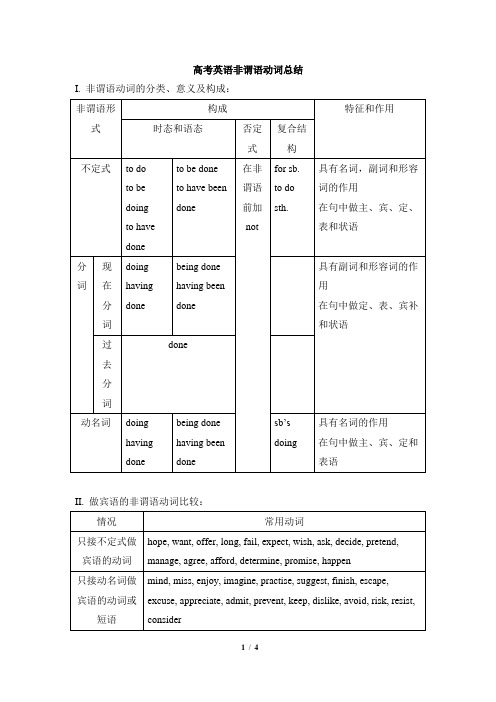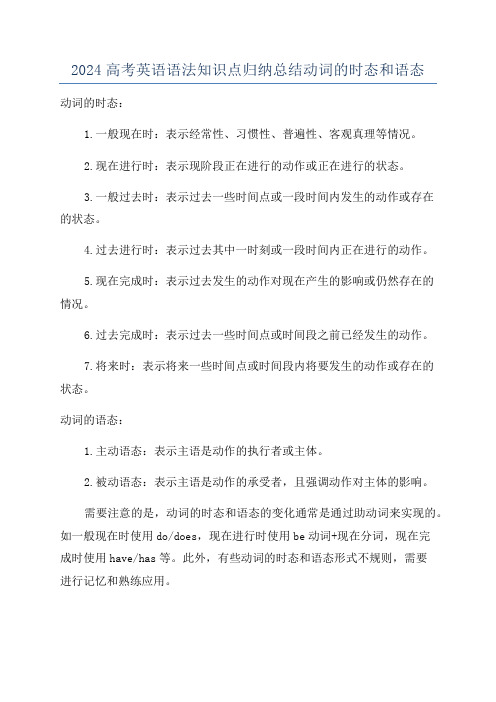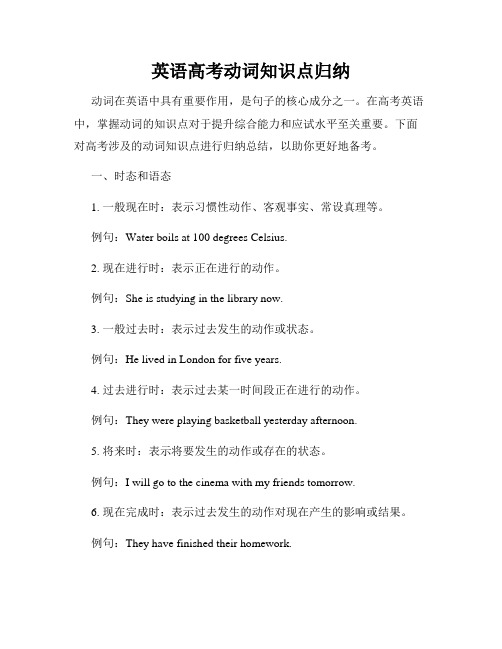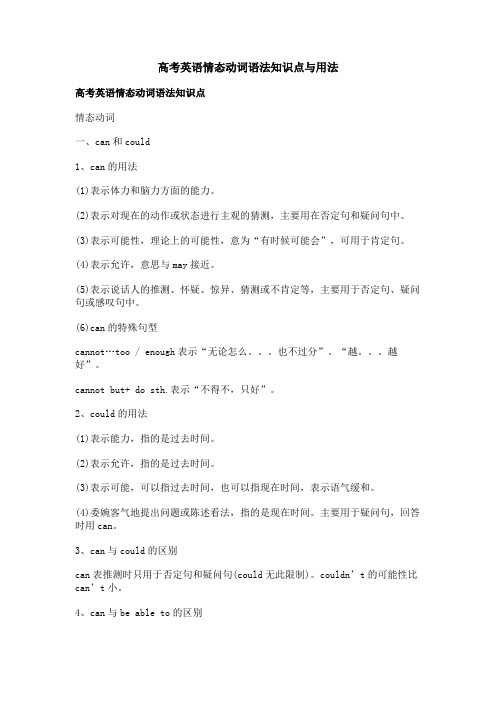高考英语动词的知识点总结
高考英语非谓语动词总结

I heard him call me several times.
have, notice, see, watch, hear, feel, let, make
现在分词
notice, see, watch, hear, find, keep, have, feel
高考英语非谓语动词总结
I.非谓语动词的分类、意义及构成:
非谓语形式
构成
特征和作用
时态和语态
否定式
复合结构
不定式
to do
to be doing
to have done
to be done
to have been done
在非谓语前加not
for sb. to do sth.
具有名词,副词和形容词的作用
I have a lot of papers to type.
I have a lot of papers to be typed.
动名词
通常指被修饰词的用途,无逻辑上的任何关系
Shall we go to the swimming pool?
现在分词
与被修饰词之间是主谓关系,表示动作与谓语动作同时发生
两者都可以
意义基本相同
begin, start, like, love, hate, prefer, continue(接不定式多指具体的动作,接动名词多指一般或习惯行为)
need, want, require(接动名词主动形式表示被动意义,若接不定式则应用被动形式)
意义相反
stop to do停止手中事,去做另一件事
主谓关系。强调动作正在进行,尚未完成
I found her listening to the radio.
2023考生必背高考英语知识点归纳总结

2023考生必背高考英语知识点归纳总结高中英语必背知识点归纳1、情态动词与助动词1、can能,可以,表说话人同意,许可还可表客观条件许可,如:You can go now.提建议或请求时可用can I, can you表客气,如Can I buy you a drink?can和be able to表能力时的区别。
can表一般具有的能力,be able to表在特定条件下的能力,如:Although the driver was badly hurt,he wasable to explain what had happened.2、may(1)可以,表说话人同意,许可或请求对方许可。
You may go.(2)(现在和将来)可能,也许,只用于肯定句和否定句中,如He may not be right.3、must,have tomust表主观上的必须,have to表客观上的必须,如:It#39;s getting late. I have to go. -Must I go now.-Yes,you must.(No, you needn#39;t./ No, you don#39;t have to.)4、need,dare这二词有实意动词和情态动词两种词性,如用作实意动词后接动词不定式to do,如用作情态动词后接动词原形。
Need I go now? --Yes, you must./No, you needn#39;t.)5、shall用于第一人称疑问句中表说话人征求对方的意见或向对方请求,如,Shall we begin our lesson?用于二、三人称陈述句,表说话人命令、警告、允诺、威胁等口吻,如: You shall fail if you don#39;t workharder.6、should表应该,意为有责任,有义务。
如:We should try our best to make our country more beautiful.7、will表有做某事的意志、意愿、安心、打算,如Will you lend me your book? Yes, I will.8、should have done表应该做而未做must have done表对过去事实的肯定推测could have done表本可以做某事9、判断句:肯定句用must,否定句用can#39;t,不太肯定用may,mightHe must be in the office now.He must have gone to bed, for the light is out.He can#39;t be in the office. He is at home.He couldn#39;t have cleaned the classroom, because he didn#39;t come here today.He might be in the office, I am not sure.He might have cleaned the room, I suppose.2让步状语从句1、though,although,as的区别A、Though,although的主句中可以用yet, still, nevertheless,但不可使用but。
高考核心动词短语总结高考英语必备

高考核心动词短语1. 以agree 为中心的词组agree on 对……达成协议;对……取得一致意见agree to 赞同某人观点、意见等suggestion, arrangement etc. agree with 赞同某人或某人的话;适合2. 以break 为中心的词组break away from 脱离,逃离break down 破坏,粉碎;瓦解;出故障,抛锚break in 闯入;打断break into 闯入;强行进入;突然开始break…into pieces打碎break off 中断;突然停止;暂停;断绝break out 突发;爆发break through 突破;突围break up 开垦,破碎;解散,分开,分解break the law 违反法律break the record 破记录break one’s promise/word 食言break sb’s heart使某人心碎break with sb.与某人断交Day breaks 天亮了;破晓3. 以bring 为中心的词组bring about造成、导致bring down打落飞机、禽鸟等;降低物价、温度等bring forward提出bring in引进;介绍;收获bring into effect/practice实行、贯彻bring out出版、发表;说出意义bring sth. to an end/ a stop/ a close使终止、结束bring sth. to mind使想起、回忆起bring together 集合;召集bring up 养育4. 以catch为中心的词组be caught doing 被发现做某事be caught in the rain 淋雨catch a bus/train 赶汽车/火车catch a cold 伤风,感冒catch fire 着火catch at sth. 想抓住、设法抓住catch the point of…抓住…的要点catch one’s eye 引人注目catch sight of 发现,瞥见catch up with 赶上,追及,追上5. 以call 为中心的词组call at 拜访某地call for 要求call in 召来;请某人帮忙call on访问某人,号召;呼吁;call out 大声叫唤;唤起6. 以come为中心的词组come across 偶尔发现,想起;越过;偿付come along 一道来,陪伴;进步,进展;出现come by 获得come from 来自,起源于,从……产生,生于come in 进来,进入;流行起来;获名次come into being 发生,产生,出现,形成come into power 开始执政,当权,当选come into use 开始使用,获得应用come on 上演;开始;赶快;发展;登台;问题被提出come out 出来,传出;出版;结果是;褪色;秘密泄露come to 苏醒,复原;共计;达到;归结于come to an end 终止,结束come to one’s rescue 营救某人come to know 开始了解到come to the point说到要点;抓住关键come true 实现,成为现实;证实come up 走近;上楼;长出,发芽7. 以do为中心的词组do a good deed 做一件好事do away with 去掉,废除;弄死;浪费do good to =do sb. good 有益于do harm to =do sb. good 有害于do one’s best 尽某人最大努力do sb. justice 公平对待某人do some cleaning V+ing,etc. 搞卫生do sb. a favor 帮助某人do well in 学得不错,干得漂亮do with处理,忍受do without 不需要,不用do wonders 创造奇迹have much to do with 和…很有关系have nothing to do with 与…无关have something to do with 和…有关That will do. 行了,够了8. 以get为中心的词组get accustomed to 习惯于,对…习以为常get across 度过,说服,使理解get ahead of 胜过,超过get along with 与…相处get down tosth./doing 开始认真考虑get in 进入,陷入;牵涉get off 送走;脱下衣服;下车get on 上车;穿上;进步,使前进;成功;相处get over 越过;恢复,痊愈;克服;完成get ready for 为…作准备get rid of 除去,去掉,免除,摆脱get through 到达,完成,通过;及格get together 积聚,积累;商谈,取得一致意见get up 起床,起立;研究,钻研;致力于;安排,组织get used to 习惯于have got=have有have got to=have to不得不9. 以give为中心的词组give away 赠送;牺牲;泄露;颁发give back 归还give in 屈服,让步,投降give in to 同意,接受;向~~让步give off 发出烟,气味give out 分发,公布give place to 让位于,被~~所替代give rise to 引起,导致;使~~发生give up 放弃;停止give way to 让步,退却;屈服于10. 以go为中心的词组go after 设法得到;追求go ahead继续进行;去做吧go all out全力以赴go back on one’s word/ promise失信go back to…追溯到go beyond 超过go down下落;减弱go down on one’s knees 跪下go in for 喜爱;从事go on to do sth.接着做另一件事情go on doing sth.继续做同一件事情go down 下去;下沉;传下去go from bad to worse每况愈下go from door to door 挨家挨户go over 仔细检查;复习go out熄灭;过时go through…经历;检查go up 增长;提高go with 与……相配;伴随go without没有…也行11. 以help 为中心的词组help sb. with sth. 帮助做can’t help doing sth.禁不住cannot help/ choose but do sth.只好,不得不cannot but do sth. 只好,不得不help sb. out 帮助摆脱困境;救出turn to sb. for help 求助于……be of help 有帮助;有用be ready to help others 乐于助人12. 以hold为中心的词组hold back 阻碍;抑制;隐瞒hold down 压制;抑制hold on坚持下去;继续;电话不挂断hold on to 抓住不放hold up 举起;耽搁;耽误hold out 伸出;提供;坚持到底hold together 合在一起;团结在一起13. 以keep 为中心的词组keep away不接近;避开keep…back 扣下;阻止;留下;忍住眼泪等keep to 遵循;坚持法规、习惯、风俗等keep off 让开;不接近keep out把……挡在外面keep up with 跟上;与……保持一致keep in touch contact with 与某人保持联系keep sb. doing sth. 使…….坚持做keep sb. from doing sth. 阻止;使免于;抑制keep silence保持安静;保持沉默keep sth. in mind记住keep sth. to oneself 把……据为己有keep sb. company与某人做伴;陪伴某人keep…under control 使得以控制14. 以know 为中心的词be known as…通称为;以着称;被认为是be known for…因而出名be known to sb.为某人所了解become well known出名as far as I know 据我所知It is well known that…众所周知know about/ of 了解;知道know…for certain确实知道know sb. by name仅知道某人的名字不认识know sb. by sight与某人面熟不熟悉know/learn …by heart背诵make…known/public公告;发表;表示15. 以leave为中心的词组leave about乱放leave alone放任不管leave behind留下;遗下leave A for B离开A去Bleave nothing to be desired尽善尽美leave out省去;遗漏leave over留下;剩下leave room for留下……余地take leave 告别ask for leave 请假16. 以let为中心的词组let alone不干涉;听之任之;更不必说let…be不干涉;听之任之let down使……失望;放下let go释放;松手Let go of me放开我let in放进来let off 放出炮、烟花、枪等,饶恕let out 发出叫喊,泄露秘密,be to let 出租17. 以look为中心的词组look about 四下环顾;查看look after 照顾,看管look around 东张西望look as if…似乎;好象look at 注视,着眼于look back 回顾look for 寻找;期待,期望look down on/upon 轻视,看不起look forward to 盼望,期待look into 窥视;调查;浏览look like 看起来象look on 旁观;面向look out 向外看;注意;当心;提防look over 从上面看过去;检查look through 透过~~看去;看穿;浏览look to 依赖look up to 仰望,尊敬look up 查出;向上看look sb. in the eye/ face直视某人18. 以make为中心的词组be made from 由…原料制成不可见原材料be made of 由…材料制成可见原材料make A into B 把 A 原材料制成B产品be made up of 由…组成make for 走向,有利于make off 匆匆离开;逃走make out 填写;开支票;理解;辨认make the best of 尽量利用make up 起草;组成;编造;化妆make up for 弥补make way for 为…让路,让路于make oneself at home 随便,别拘束make an attempt 试图,尝试make a decision 做决定make a fire生火make a fool of 愚弄,欺骗make a living 谋生make a mistake 弄错make fun of 取笑make use of 使用,利用make sure/certain 确定,确信make contact with与…接触,与…联系make every effort to do sth. 竭尽全力做某事make friends with 和…交友make preparations for 为…作准备make arrangements for 为…作安排make bed铺床make sth. clear 表明;说明make sth. possible 使…成为可能make sth. a rule 将…定为规则make ends meet应付开支;维持生活;使收支相抵make up one’s mind决心;决定to make a long story short长话短说to make things worse 使情况更糟糕的是make sb.’s hair stand on end使……毛骨悚然I can make it 我能行Cold tea makes the best drink in summer. 凉茶是夏天最好的饮料19. 以pull为中心的词组pull back往后撤, 使撤退pull down拉倒, 摧毁pull in车进站, 停站; 船靠岸pull off 扯下; 撕开, 剥掉pull out拔出, 挖出;离开, 撤走; 突然撤走,车, 船驶出pull through 度过难关,从疾病中康复pull up 拔起;使停下;阻止pull a long face 拉长脸,生气pull one’s leg 取笑某人20. 以put为中心的词组put across 清楚地表达put aside 把…放在一边;搁置;排除put away 把某物收起来;放好put down 放下;镇压;制止;记下;put forward 提出;建议,推荐;把钟表指针前拨put off 关掉;熄灭;脱掉;推迟put on 穿上;假装;增加;欺骗;上演;开灯或收音机等put out 熄灭:出版;公布;伸出put one’s heart into 全神贯注,专心致志put up 举起;搭建;提出计划、方案等;留宿put up with 忍受,容忍put on airs摆架子put in a word for sb.为某人进言21. 以see为中心的词组see about 开始;着手see 为某人送行see to sth.处理;料理see to it that…注意做到;务必要see to 注意;留心see through 看穿see about sth.负责处理……as far as I can see据我所知22. 以set为中心的词组set about doing sth.= set out to do sth.开始做set aside 留出;拔出;把…搁置set out 出发;开始;阐述,列举set off 出发;启程;着手做某事set up 树立;建立;设立;提出set an example to sb. 为…做出榜样set fire to sth.= set sth. on fire放火烧set foot in…进入;踏上set off 动身;燃放鞭炮、烟花等;引起set one’s mind/ heart on…下定决心set free释放; 解放set in季节, 时期等开始, 来临; 患上某种疾病潮汐上涨, 涌入The sun sets in the west.日落西方;a play that is set in Venice.以威尼斯为背景的戏剧set sail 扬帆,开航set an alarm clock.上闹钟a set of false teeth 一副假牙23. 以speak为中心的词组speak for 代表……说话;为……辩护speak out大胆讲出来speak up 坦率说出自己的看法speak highly/well/highly/ill/badly of 对某人/某事称赞或非议generally/strictly/roughly/frankly speaking 一般来说,严格地讲,粗略地讲,老实地说nothing to speak of…不值一说;没有说的价值24. 以stand为中心的词组stand at attention/ease立正/稍息stand back 退后, 靠后站stand behind后援, 做后盾stand by 支持;遵守;袖手旁观stand for 代表;象征stand in with与……分担stand out 站出来,突出stand up 站起;站得住脚stand up for 拥护、支持……stand up to经得起……stand still 站住不动25. 以take为中心的词组take after 外貌、性格上与父母相像take away 拿走;夺去take back 收回;取消take down 取下;记下take A for B 把A当作Btake in 接纳;吸收;理解;欺骗take on 呈现;承担;雇用take off 脱去;起飞take over 接收;接管take up 开始从事;把某事继续下去,占据take aim 瞄准,设立目标take advantage of 利用take care of 注意;照顾;提防;take a seat 就坐take a shower 淋浴,洗澡take a boat/a bus 坐火车/船/公车take a walk/rest 散步/休息take a chance 冒险,碰运气take action/measures to do…采取行动/措施take charge of 掌控take delight/ pleasure/ interest /pride in…喜欢、以……自豪take effect 生效,奏效take exercise 做体操、健身take it easy 别着急,慢慢来take… into account/consideration 把…考虑在内take one’s place 就坐take no notice of 不理睬take office 就职take one’s time 慢慢来,不着急take one’s temperature 量体温take part in 参与,参加take place 发生,举行take risk to do 冒险做…take shape 成形take sb. by the arm 拉某人的胳膊take the place of 代替take the lead 为首,领头take the chair 主持会议be taken ill/sick 生病take things as they come随遇而安take… for granted认为…是当然的take …seriously 认真看待take trouble/pains to do 不辞辛苦的做…take turns to do sth. 轮流做某事26. 以tell 为中心的词组tell A and apart= tell A from B区分开A与Btell right from wrong 辨别是非to tell the truth说老实话tell sb. about/ of sth.向某人讲起tell a lie说谎tell a white lie说善意的谎言tell one’s fortune 算命,占卜tell it like it is实话实说there is no telling…不知道,说不出27. 以think 为中心的词组think about 考虑是否去做think of 想起,考虑think over 反复思考think aloud 自言自语think twice about sth./doing sth. 三思而行think better of it/of doing sth 深思熟虑后决定不做, 一想又改变主意think of…as…把…视作为think sb./sth. adj.kind/ generous/smart, etc. 认为某人/某物善良/慷慨/聪明等think highly/ well/ill of …对…有好/不好的评价What do you think of sthHow do you like sth 你怎么看待…think nothing of 不屑一顾:视为常规或平常in one’s turn 轮到某人做某事out of turn 不按次序的,不合适宜的by turns 轮流in turn 依次,倒过来也take one’s turn to do 轮到做turn away from 厌恶turn back 折回,往回走turn down 把音量调低;拒绝turn in 上缴;拐弯进入turn into 进入;使变成turn to sb. for help 求助于turn off 关掉;制造;生产turn on 打开turn out关掉;制造;培养;证明是turn around 旋转,转过身来;改变意见;采取新政策turn to 转向;变成;求助于turn over a new leaf 翻开新的一页,重新开始,改过自新turn up 音量调高,出现turn a blind eye to 对……视而不见turn a deaf ear to sth. 对……充耳不闻t urn…upside down/ inside out颠倒, 翻过来work at 学习;研究;致力于work on 从事;对…产生影响,起作用work out 制定出, 算出,理解work with…对……行得通at work 在工作:in/out of work 有/没有工作失业。
高中英语高考常见动词短语归纳总结

英语高考常见动词短语归纳总结♣ look 的常用短语:look up … in查找look sb. up and down 上下打量look back to/ upon回顾look upon…as把… 看作look forward to期待look through浏览; 看穿take a new look呈现新面貌♣ fear的常用短语:in fear害怕地(be) in fear of 害怕for fear of/ that担心;生怕♣ concentrate 的常用短语:concentrate on 专心…concentrate one’s mind on 专心于…类似的短语:fix one’s mind uponfocus onput one’s heart intofocus one’s mind on♣surprise常用短语:in surprise惊讶地to one’s surprise 使某人惊讶的是be surprise at/to do/that对某事感到惊讶♣表示“穿衣”的动作或状态的词和短语1.表示动作的有:pull onput ondressdress sb2. 表示状态的有:wearbe inbe dressed inhave … on♣常见表“喜欢”的短语和单词likecare forbe keen onbe fond oftake delight in…♣ trouble的常用短语:have much trouble / no trouble (in) doing 在…有/没有困难take great trouble to do不辞辛劳做某事put sb t o the trouble of doing …为难某人做某事make trouble捣乱be in (great) trouble惹麻烦;处在困境中help sb. out of trouble帮某人摆脱困境♣ end的常用短语:come to an end……结束put an end to 结束……on end竖起, 连续in the end终于; 最后end up (by) doing…以……结束make both ends meet收支相抵♣ 表示“导致”、“由…引起”的短语:1. 导致cause sth. (to do)result inlead to2. 由……引起be caused byresult fromgrow out oflie in♣表“全力以赴”的短语:do / try one’s bestspare no efforts to dotake great pains to dogo all out to dodo what somebody can (do) to dodo all somebody can (do) to do♣ direction常用短语:in (the ) direction of….朝……方向under the direction of ...在……的指导下follow the directions照说明去做♣ far常用短语:far from (being)离……要求相差很远far from +(a place)距离某地很远far away遥远so far 到目前为止; 那么远as far as sb. knows/sees据某人所知by far(最高级前,比较级后)起强调作用♣ distance常用短语:in the distance在远处from/ at a distance从远处keep sb. at a distance于某人保持一定距离It is no distance at all.不远♣ use常用短语:used to do过去曾经、常做be used to doing …习惯于……be used to do被用来做……make good/ full use of充分利用……come into use开始使用……it is no use doing …干……没有用♣“出了什么事”的几种不同表达What’s wrong with….?What’s the matter with…?What’s the trouble with…?What happened (to sb.) ?♣“众所周知”常用表达法:It is known to all that…主语从句,that 不能省As is known to all,定语从句,置于句首We all know (that)后接宾语从句Everyone knows (that)后接宾语从句, which is known to all.非限定从句,置于句末♣表“同意某人意见”的常用短语:agree with sb. /what sb. saidagree to sth.approve (of) sth.in favour of sth.be agreeable to sth.be for sth.“不同意”disagree with sb./ what sb. saidobject to sth.disapprove (of) sth.be against sth.♣ sign的常用短语:sign one’s name签名sign to sb (not) to do sth.示意某人(不)做某事signs of ………的迹象♣would rather 与prefer 的区别1.宁愿做……而不做……would rather do A than do Bprefer A to Bprefer to do A rather than do B2. would rather 主语+ 过去式,表示“宁愿”eg. I would rather you came tomorrow than today.should prefer sb. to do sth./ should prefer 主语+ 过去式,表示“比较喜欢……”eg. I should prefer you not to go there alone.OR: I should prefer that you did not go there alone.♣trap常用短语be caught in a trap落入圈套be led into a trap中圈套set a trap to do sth.设圈套……be trapped in sth.被…..所围困♣ grow常用短语in the grow of在….成长中grow up长大; 成长grow rich on靠….. 变富grow into长成……grow out of由…..引起/滋生出♣ make常用短语be made up of =consist of 由……组成make up for弥补be made from/ of由……造成make up编造;组成;化妆be made into制成……make fun of取笑; 嘲弄make a living 谋生supply, provide, offer 的区别:1.表示“向某人提供某物”supply / provide sb. with sth.supply / provide sth. for sb.supply sth. to sb.offer sb. sth.2. 表示“主动提出做某事”offer to do sth.3. 表示“倘使”、“假如”provided / providing that= on condition that=only if4. 表示“满足需要”supply / meet a need.♣ supply的常用短语in short supply 缺乏,不足medical/military supply医疗/军用品supplies of…许多♣ lack的常用短语be lacking in sth. 在……不足make up for the lack of弥补……的不足for/by/from/thr ough lack of…由于…不足,缺乏have no lack of不缺♣damage的常用短语do damage/harm to 对……有害cause damage to 对……造成损害ask for damage要求赔偿die of 与die from 的区别die of 表示“死于……病”或冻死、气死,或死于过度悲伤。
高考英语复习 专题05 动词的-ing形式 知识点归纳总结

高考英语复习专题05 动词的-ing形式知识点归纳总结动词的-ing形式包括传统语法的“动名词”(gerund)和“现在分词”(present participle)两个部分。
动词的-ing形式具有动词的特征,同时又具有名词、形容词和副词的特征,因此它可以在句中作主语、表语、定语、宾语、宾语补足语和状语。
一、动词-ing形式的特征和种类与动词不定式一样,动词的-ing形式也具有动词的特征,有时态和语态的变化,并可带状语、宾语等。
A.动词-ing形式的一般式1. 动词-ing形式的一般式可用来泛指一个动作,没有特别的时间意义。
Swimming is her favorite sport. 游泳是她最喜欢的体育运动。
Learning is important to modern life. 学习对现代生活很重要。
2. 动词-ing形式的一般式可用来表示和谓语动词同时发生的动作。
They went out of the classroom, talking and laughing. 他们有说有笑地走出教室。
She listened carefully to her neighbours speaking. 她倾听她邻居的讲话。
3. 动词-ing形式的一般式有时也可表示在谓语动词的动作之前或之后发生的动作。
I remembered sending him an e-mail last week. 我记得上星期给他发过一份电子邮件。
He suggested taking my daughter to the zoo the next Sunday. 他建议下个星期天带我女儿去动物园。
B. 动词-ing形式的完成式动词的-ing形式的完成式表示一个已完成的动作,这个动作发生或完成在谓语动词表示的动作之前。
Having lived in this city for three years, she knows it very well. 在这个城市生活了3年,她对这里已很熟悉。
2024高考英语语法知识点归纳总结动词的时态和语态

2024高考英语语法知识点归纳总结动词的时态和语态
动词的时态:
1.一般现在时:表示经常性、习惯性、普遍性、客观真理等情况。
2.现在进行时:表示现阶段正在进行的动作或正在进行的状态。
3.一般过去时:表示过去一些时间点或一段时间内发生的动作或存在
的状态。
4.过去进行时:表示过去其中一时刻或一段时间内正在进行的动作。
5.现在完成时:表示过去发生的动作对现在产生的影响或仍然存在的
情况。
6.过去完成时:表示过去一些时间点或时间段之前已经发生的动作。
7.将来时:表示将来一些时间点或时间段内将要发生的动作或存在的
状态。
动词的语态:
1.主动语态:表示主语是动作的执行者或主体。
2.被动语态:表示主语是动作的承受者,且强调动作对主体的影响。
需要注意的是,动词的时态和语态的变化通常是通过助动词来实现的。
如一般现在时使用do/does,现在进行时使用be动词+现在分词,现在完
成时使用have/has等。
此外,有些动词的时态和语态形式不规则,需要
进行记忆和熟练应用。
英语高考动词知识点归纳

英语高考动词知识点归纳动词在英语中具有重要作用,是句子的核心成分之一。
在高考英语中,掌握动词的知识点对于提升综合能力和应试水平至关重要。
下面对高考涉及的动词知识点进行归纳总结,以助你更好地备考。
一、时态和语态1. 一般现在时:表示习惯性动作、客观事实、常设真理等。
例句:Water boils at 100 degrees Celsius.2. 现在进行时:表示正在进行的动作。
例句:She is studying in the library now.3. 一般过去时:表示过去发生的动作或状态。
例句:He lived in London for five years.4. 过去进行时:表示过去某一时间段正在进行的动作。
例句:They were playing basketball yesterday afternoon.5. 将来时:表示将要发生的动作或存在的状态。
例句:I will go to the cinema with my friends tomorrow.6. 现在完成时:表示过去发生的动作对现在产生的影响或结果。
例句:They have finished their homework.7. 过去完成时:表示过去某一时间点之前已经发生的动作或存在的状态。
例句:I had already eaten dinner when he arrived.8. 被动语态:强调动作的承受者或结果。
例句:The book was written by Mark Twain.二、情态动词1. can/could:表示能力、允许、请求等。
例句:She can swim very well.2. may/might:表示可能性、许可、建议等。
例句:You may borrow my book.3. must:表示必须、推测等。
例句:You must finish your homework before watching TV.4. will/would:表示意愿、打算、愿意等。
高考英语情态动词语法知识点与用法

高考英语情态动词语法知识点与用法高考英语情态动词语法知识点情态动词一、can和could1、can的用法(1)表示体力和脑力方面的能力。
(2)表示对现在的动作或状态进行主观的猜测,主要用在否定句和疑问句中。
(3)表示可能性,理论上的可能性,意为“有时候可能会”,可用于肯定句。
(4)表示允许,意思与may接近。
(5)表示说话人的推测、怀疑、惊异、猜测或不肯定等,主要用于否定句、疑问句或感叹句中。
(6)can的特殊句型cannot…too / enough表示“无论怎么。
也不过分”。
“越。
越好”。
cannot but+ do sth.表示“不得不,只好”。
2、could的用法(1)表示能力,指的是过去时间。
(2)表示允许,指的是过去时间。
(3)表示可能,可以指过去时间,也可以指现在时间,表示语气缓和。
(4)委婉客气地提出问题或陈述看法,指的是现在时间。
主要用于疑问句,回答时用can。
3、can与could的区别can表推测时只用于否定句和疑问句(could无此限制)。
couldn’t的可能性比can’t小。
4、can与be able to的区别(1)现在时:无区别,但后者不常用。
(2)完成时;can没有完成时,此时要用have(has,had)been able to。
(3)将来时:can没有将来时,要用will be able to。
(4)过去时:could表示一般能力,was/were able to 表示在具体场合通过努力成功做成某事的能力。
二、may 和might1、may的用法(1)表示询问或说明一件事可不可以做。
(2)表示一件事或许会发生或某种情况可能会存在,通常用在肯定句和否定句中。
注意:表示可能性时,can’t语气强,表示“不可能”,may not语气弱,表示“可能不”。
2、might的用法(1)表示询问或允许,指的是过去时间。
(2)表示可能发生的事,可以指过去时间,也可以指现在时间,语气更加不肯定,可能性比may小一些。
- 1、下载文档前请自行甄别文档内容的完整性,平台不提供额外的编辑、内容补充、找答案等附加服务。
- 2、"仅部分预览"的文档,不可在线预览部分如存在完整性等问题,可反馈申请退款(可完整预览的文档不适用该条件!)。
- 3、如文档侵犯您的权益,请联系客服反馈,我们会尽快为您处理(人工客服工作时间:9:00-18:30)。
高考英语动词的知识点总结
高考英语词汇是高考生复习的重中之重,在高考一轮复习当中动词是比较重要的。
下面是我为大家整理的关于高考英语动词的学问点(总结),盼望对您有所关心。
欢迎大家阅读参考学习!
高考英语动词学问点:turn
(1) He was poor but proud and turned down every offer of help.拒绝接受
(2) The campers usually turned in as soon as it got dark.上床睡觉
(3) The teachers have to turn in the reports at the end of the school year.上交
(4) The examination turned out(to be)easy.结果是,最终状况是
(5) Bob turns over most of the money he earns to his mother.移交,交给
(6) The car struck the wall and turned over.撞翻,翻倒
(7) He turned over in bed.翻身,翻转
(8) Please turn over this page.翻过
(9) The missing boy turned up消失
(10) If you have some questions,you can turn to your teachers for help.求助于
(11) Mozarts music always turns me on/off.使感爱好/使不感爱好
(12) She turned away in horror at the sight of so much blood.转身
不看
(13) Because the hall was full,many people were turned a way.撵走
(14) turn a blind eye to/on视而不见
(15) turn a deaf ear to 充耳不闻
(16) turn about向后转
(17) turn against反对,背叛
(18) turn back返回,折回,使往回走
(19) by turns轮番
(20) in turn一个挨一个地又(对别人)做同样的事
(21) take turns轮番(做某事)
高考英语动词turn练习以及答案
1、I have waited for him for hours but he hasnt ________________ (appeared)yet.
2、His invitation is ________________ (refused).
3、If you dont know the words,you can ________________ (refer to)a dictionary.
答案:1、turned up 2、turned down 3、turn to
2021年高考全国I卷英语试题点评
从2021年新课标卷的考题来看,听力部分,沿用了往年小对话+长对话+独白的考题形式,语速与往年并无变化,对于同学来说,根据往年考试难度做好听力的预备并不是难事。
阅读部分,正如顾斐老师在考前猜测的那样,A篇是一篇(广告)
体(文章),细节题为主,考生需要依据问题,回到原文去精确定位,找到问题的答案。
而BCD篇分别涉及到了(记叙文)、(说明文),题型也包含了细节题、主旨题、词义猜想题、推断题等多种题型,与2021年相比,题量和难度并无太大变化,可能对于考生来说,在考场上能够把控做题时间,合理支配做题挨次,并且精确运用顾斐老师在学而思网校课堂上所传授的学问,讲精确定位、同义替换、挨次对应等解题技巧做到娴熟运用,就能事半功倍。
从完型填空来看,动词考点是43、47、49、51、52、53、56、57和59题。
名词考点是42、45、48、50和55,其他为形容词和副词考点。
依据顾斐老师在考试前给同学供应的完形填空复习建议,动词+名词占据完型选项70%的考点,而这一点在今年的考试中也得到了充分的体现,这就要求高中生在平常的(英语学习)中,对于词汇的词义辨析、固定搭配、特别用法等有特别熟识的了解,并且对名词和动词要赐予足够的重视。
而从今年完型的考点来看,有一些常考学问点,如giveup,require,choose等依旧在考,而一些新考点也进入了我们的视野,如recite,embarrass等,也需要同学平常学习时要学会抓重点,更要留意不遗漏要点。
